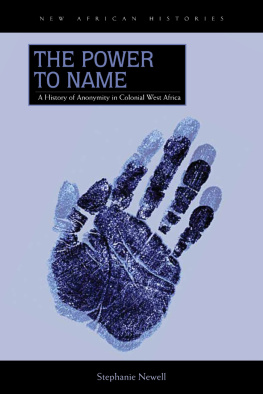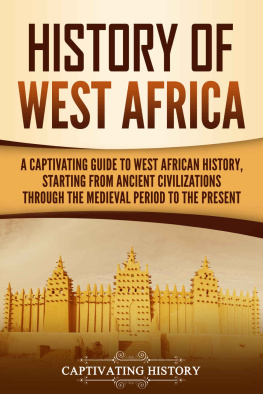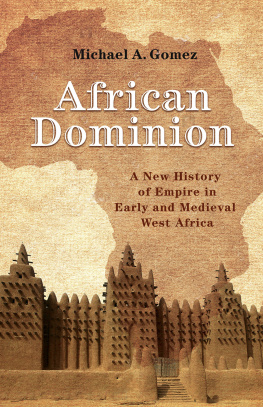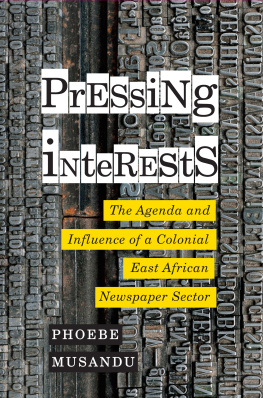The Power to Name
NEW AFRICAN HISTORIES SERIES
SERIES EDITORS: JEAN ALLMAN AND ALLEN ISAACMAN
Books in this series are published with support from the Ohio University National Resource Center for African Studies.
David William Cohen and E. S. Atieno Odhiambo, The Risks of Knowledge: Investigations into the Death of the Hon. Minister John Robert Ouko in Kenya, 1990
Belinda Bozzoli, Theatres of Struggle and the End of Apartheid
Gary Kynoch, We Are Fighting the World: A History of Marashea Gangs in South Africa, 19471999
Stephanie Newell, The Forgers Tale: The Search for Odeziaku
Jacob A. Tropp, Natures of Colonial Change: Environmental Relations in the Making of the Transkei
Jan Bender Shetler, Imagining Serengeti: A History of Landscape Memory in Tanzania from Earliest Times to the Present
Cheikh Anta Babou, Fighting the Greater Jihad: Amadu Bamba and the Founding of the Muridiyya in Senegal, 18531913
Marc Epprecht, Heterosexual Africa? The History of an Idea from the Age of Exploration to the Age of AIDS
Marissa J. Moorman, Intonations: A Social History of Music and Nation in Luanda, Angola, from 1945 to Recent Times
Karen E. Flint, Healing Traditions: African Medicine, Cultural Exchange, and Competition in South Africa, 18201948
Derek R. Peterson and Giacomo Macola, editors, Recasting the Past: History Writing and Political Work in Modern Africa
Moses Ochonu, Colonial Meltdown: Northern Nigeria in the Great Depression
Emily Burrill, Richard Roberts, and Elizabeth Thornberry, editors, Domestic Violence and the Law in Colonial and Postcolonial Africa
Daniel R. Magaziner, The Law and the Prophets: Black Consciousness in South Africa, 19681977
Emily Lynn Osborn, Our New Husbands Are Here: Households, Gender, and Politics in a West African State from the Slave Trade to Colonial Rule
Robert Trent Vinson, The Americans Are Coming! Dreams of African American Liberation in Segregationist South Africa
James R. Brennan, Taifa: Making Nation and Race in Urban Tanzania
Benjamin N. Lawrance and Richard L. Roberts, editors, Trafficking in Slaverys Wake: Law and the Experience of Women and Children
David M. Gordon, Invisible Agents: Spirits in a Central African History
Allen Isaacman and Barbara Isaacman, Dams, Displacement, and the Delusion of Development: Cahora Bassa and Its Legacies in Mozambique, 19652007
Stephanie Newell, The Power to Name: A History of Anonymity in Colonial West Africa
The Power to Name
A History of Anonymity in
Colonial West Africa
Stephanie Newell
OHIO UNIVERSITY PRESS

ATHENS
Ohio University Press, Athens, Ohio 45701
ohioswallow.com
2013 by Ohio University Press
All rights reserved
To obtain permission to quote, reprint, or otherwise reproduce or distribute material from Ohio University Press publications, please contact our rights and permissions department at (740) 593-1154 or (740) 593-4536 (fax).
Printed in the United States of America
Ohio University Press books are printed on acid-free paper

23 22 21 20 19 18 17 16 15 14 13 5 4 3 2 1
Library of Congress Cataloging-in-Publication Data
Newell, Stephanie, [date]
The power to name : a history of anonymity in colonial West Africa / Stephanie Newell.
pages cm. (New African histories)
ISBN 978-0-8214-2032-4 (pb : alk. paper) ISBN 978-0-8214-4449-8 (electronic)
1. African newspapersAfrica, WestHistory19th century. 2. African
newspapersAfrica, WestHistory20th century. 3. Anonymous writings
History19th century. 4. Anonymous writingsHistory20th century. 5. Literary
forgeries and mystifications. 6. Africa, WestIntellectual life19th century. 7.
Africa, WestIntellectual life20th century. 8. Books and readingAfrica, West
History19th century. 9. Books and readingAfrica, WestHistory20th century.
I. Title. II. Series: New African histories series.
PN5450.5.W34N49 2013
079.6609dc23
2013020423
Contents
Chapter 1 The Fourth and Only Estate
Defining a Public Sphere in Colonial West Africa
Chapter 2 Articulating Empire
Newspaper Networks in Colonial West Africa
Chapter 5 Printing Women
The Gendering of Literacy
Chapter 6 Nominal Ladies and Real Women Writers
Female Pseudonyms and the Problem of Authorial Identity in the Cases of Rosa and Marjorie Mensah
Conclusion New Visibilities
African Print Subjects and the Birth of the (Postcolonial) Author
Appendix
I. T. A. Wallace-Johnson in Court
Illustrations
Acknowledgments
In the six years it has taken me to research and write this book, I have benefited from the ideas and feedback of numerous scholars. Above all, I am indebted to Karin Barber, David Pratten, and Derek Peterson, not only for sharing their treasure troves of archival discoveries but also for the sheer intellectual force of their engagement with colonial African newspapers. The ideas in the chapters that follow have been inspired by workshops, discussions, seminars, and dinners with these scholars.
Other people who generously shared ideas and work, often ahead of publication, include Jesse Shipley, Kate Skinner, Bianca Murillo, Tunde Awosanmi, and David Kerr. Lively environments for discussion of my ideas about folktales were provided by Chris Warnes and the visiting fellows of 2010 at the African Studies Centre in Cambridge: Eiman el-Nour, Kenneth Simala, James Tsaaior, Tunde Awosanmi, and Oyeniyi Okunoye.
Research for this book would not have been possible without a generous British Academy Research Development Award (BARDA) in 201011. Two chapters had previous incarnations as scholarly articles: a short version of the introduction was first published as Something to Hide? Anonymity and Pseudonyms in the Colonial West African Press, Journal of Commonwealth Literature 45, no. 1 (2010): 922, and chapter 2, Articulating Empire: Newspaper Networks in Colonial West Africa, was first published as Articulating Empire: Newspaper Readerships in Colonial West Africa, New Formations 73, no. 2 (2011): 2238. I am grateful to the publishers for permission to reprint material from these articles.
Above all, I am indebted to Bart Cammaerts for his suggestions, ideas, humor, brilliance, and delicious dinners, and I dedicate this book to him with love.
INTRODUCTION
Anonymity, Pseudonymity, and the Question of Agency in Colonial West African Newspapers
What cannot one say behind the screen of a nom-de-plume?
Charles E. Graves
Scholars of the imperial encounter are generally keen to emphasize the agency of colonized subjects in questions of political resistance, personal testimony, and anticolonial activism. As with many social and cultural histories of colonial Africa, one gets the impression that the African subjects he describes took themselves very seriously in their vocalizations of identity as they sought a mode of self-expression for their self-made subjectivity in colonial settings.









 ATHENS
ATHENS